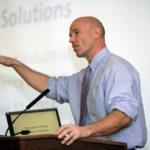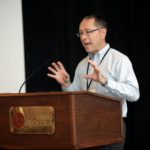Energy Efficiency and Corporate Culture Headline November Meeting
The November monthly meeting of the West Michigan Sustainable Business Forum brought together over 90 member representatives for an afternoon of engrossing presentations on energy efficiency, smart energy technology, and corporate sustainability.
The luncheon featured discussions on energy conservation and efficiency from Dennis McKee and Bob Joba of Consumers Energy and David Rinard from Steelcase, Inc.
WMSBF Director Daniel Schoonmaker opened the meeting with remarks on the Forum’s current benchmarks and goals for member businesses in coming months.
Schoonmaker was followed by McKee, Communications Director for the Consumers Energy Smart Energy Program. McKee focused on new developments in Consumers Energy’s power distribution hardware that will allow for greater efficiency and energy savings for both business and residential customers.
Notably, McKee highlighted the potential applications for new Smart Meters, power meters that can communicate over wireless networks, for tracking energy use more accurately across West Michigan. The information acquired from Smart Meter tracking would allow for better power production management by Consumers and also give Consumers customers the opportunity to take advantage of new efficiency incentives programs.
“The price of generating electricity, of purchasing electricity to provide it our customers reliably, that changes throughout the day,” said McKee. He continued by saying that Smart Meters will allow Consumers Energy to track times when power is used by customers, allowing Consumers to create programs that reward participating customers for using less power during high-demand periods of the day.
“This lets us use power production facilities more economically and more efficiently,” McKee said.
Bob Joba, Energy Management Engineer at Consumers, followed McKee with a presentation on Consumers’ various energy efficiency programs. Joba opened with an overview of the benefits of energy management and efficiency programs for those who decide to participate.
“The first thing is, it’s good for business,” said Joba. “When you save energy, it goes right to your bottom line—it saves costs.”
“It’s good for the environment. If you don’t use electricity or run your furnace more efficiently, you don’t use the gas or the electricity, which means we don’t burn the fuel to run power plants. That helps the environment,” he continued. “And, it’s good for Michigan—we will create jobs through these energy efficiency programs.”
Joba also highlighted quicker payback times, lowered energy and maintenance costs, and increased productivity and employee morale as further benefits of making energy efficiency improvements.
He went on to describe the range of energy efficiency incentive programs that Consumers offers for West Michigan businesses, from plans that target large industrial operations to small businesses and school districts.
To show how these programs can be successful, Joba used the example of Flushing Community Schools’ collaboration with Consumers to cut back on energy use. With incentives from Consumers helping to fund improvements on the district’s buildings, the district was able to reduce electricity and gas consumption drastically.
Rinard, Director of Global Environmental Performance for Steelcase, Inc, wrapped up the luncheon meeting with his presentation on the organizational aspects of efficiency and energy initiatives.
Using his experiences with Steelcase as an example, Rinard explained his processes for creating metrics to measure environmental progress and establish baseline goals that corporations can achieve.
However, Rinard was quick to highlight that the goals not only have to line up with measurements and metrics, but also the distinct corporate culture of each unique company.
“It’s easy for a lot of people to look in and say, ‘That’s the organization’s problem, that’s Steelcase’s problem.’ But Steelcase is nothing more than a whole lot of people that come to work everyday,” said Rinard.
“If those people don’t feel that they’re engaged at some level during the day, the company will not accomplish its goals,” he continued. “You’ve got to lay it out up front, communicate regularly, and celebrate the accomplishments.”
Rinard illustrated his points by describing how Steelcase engaged its entire workforce in promoting energy efficiency and environmental concern through various programs, from simply turning computer monitors off when not in use to large-scale infrastructure adjustments.
Rinard also highlighted the unique nature of West Michigan business that allows a culture of sustainability to flourish.
“We are competitive – fiercely competitive – but in this realm, in a way, we’re working in what I call coopetition. There’s a sense of cooperation and competition all rolled together, and sometimes it really impacts us.”
“That’s really the genesis of the Business Forum. It’s about working together in a way to share best practices not just across the furniture industry, but across all industries.”
RSVPs are currently being accepted for the December meeting, which will take place on Monday, December 9 at Kentwood Office Furniture.




